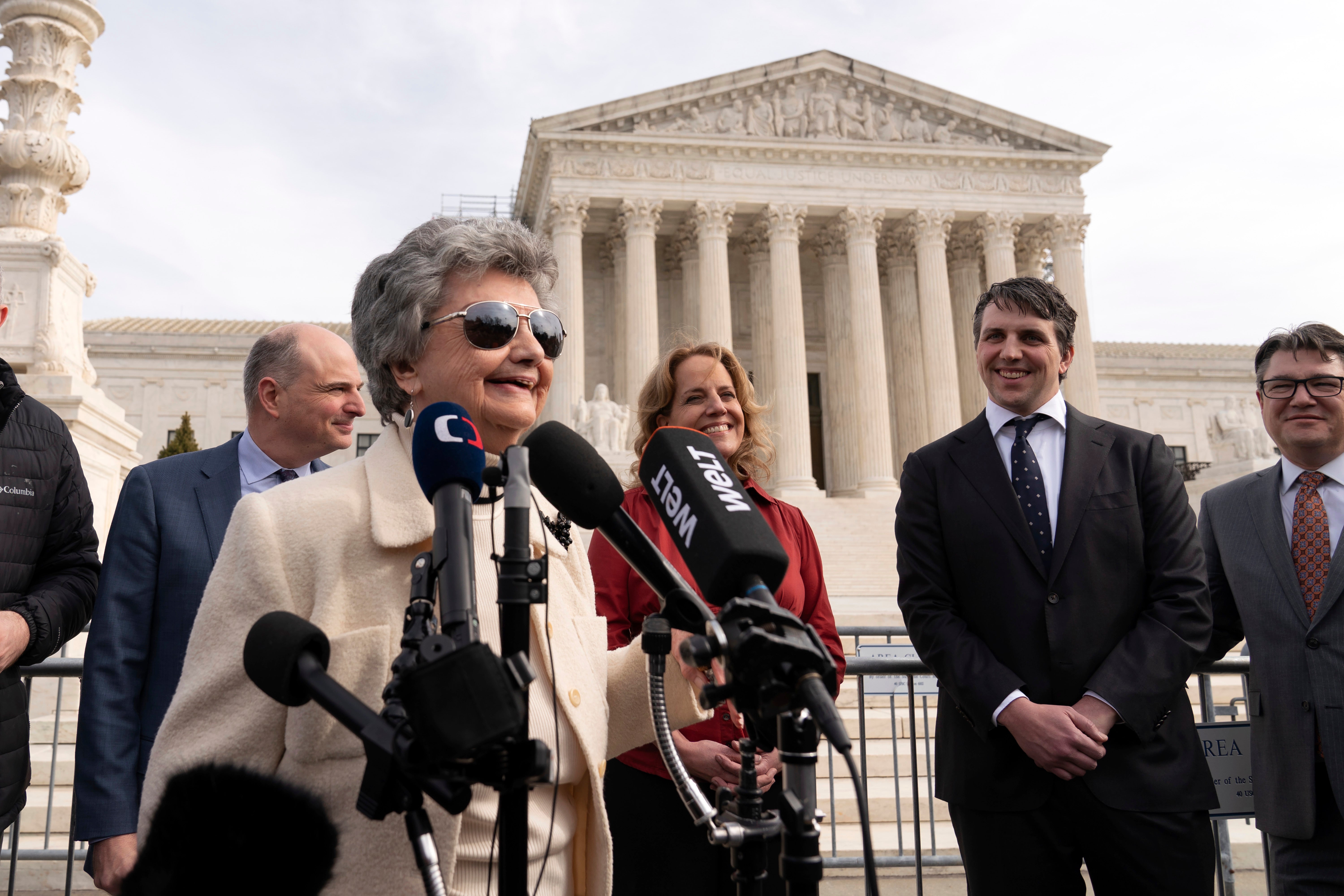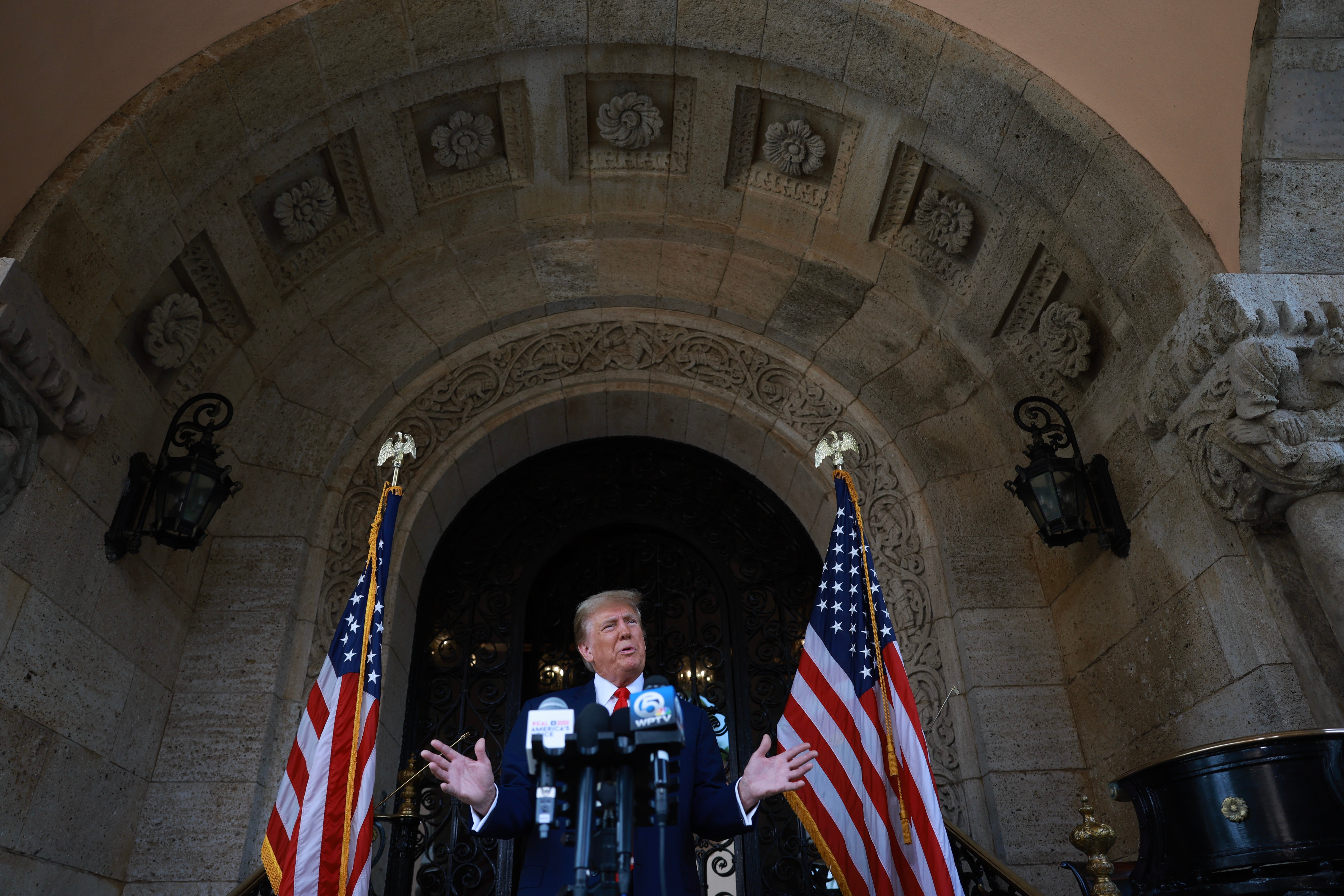Supreme Court appears set to strike down Colorado ruling to kick Trump off 2024 ballot
A decision from the nation’s highest court could have a seismic impact on 2024 elections
Your support helps us to tell the story
From reproductive rights to climate change to Big Tech, The Independent is on the ground when the story is developing. Whether it's investigating the financials of Elon Musk's pro-Trump PAC or producing our latest documentary, 'The A Word', which shines a light on the American women fighting for reproductive rights, we know how important it is to parse out the facts from the messaging.
At such a critical moment in US history, we need reporters on the ground. Your donation allows us to keep sending journalists to speak to both sides of the story.
The Independent is trusted by Americans across the entire political spectrum. And unlike many other quality news outlets, we choose not to lock Americans out of our reporting and analysis with paywalls. We believe quality journalism should be available to everyone, paid for by those who can afford it.
Your support makes all the difference.US Supreme Court justices appeared to doubt state authority to disqualify Donald Trump from holding public office, after the former president challenged a landmark court ruling from Colorado’s highest court which found him ineligible for the presidency due to his actions surrounding January 6.
An historic two-hour hearing at the nation’s highest court on Thursday heard oral arguments in a case that could determine whether the leading candidate for the Republican Party’s nomination for president can remain on ballots in primary elections.
Last year, justices on Colorado’s Supreme Court disqualified Mr Trump under the scope of Section 3 of the 14th Amendment, which holds that “no person” can hold any office, “civil or military, under the United States”, if they “engaged in insurrection or rebellion against the same”.
But both conservative and liberal justices on the nine-member US Supreme Court on Thursday appeared to cast doubt on the ability of individual states to disqualify federal candidates without permission from Congress.
The justices will issue their decision in Trump v Anderson at a later date.
Chief justice John Roberts said granting states control over candidates for federal election would be “at war” with the Constitution and warned that a decision to disqualify Mr Trump could open up attempts to disqualify candidates “on the other side”.
“In very quick order I would expect … that a goodly number of states will say whoever the Democratic candidate is, you’re off the ballot,” he said. “And it will come down to a handful of states that will determine the presidential election.”
“Why should that be the right rule?” asked justice Elena Kagan. “Why should a single state make that determination, not just for their own state, but for the whole nation?”
Justice Sonia Sotomayor, however, called Mr Trump’s legal argument “a bit of a gerrymandered rule designed only to benefit your client”.

Justices spent relatively little time trying to define “insurrection” let alone whether Mr Trump had “engaged” with it after a mob of his supporters stormed the US Capitol to block the certification of 2020 presidential election results, fuelled by his ongoing baseless narrative that the election was “rigged” against him, while calling on his supporters to “fight like hell” on his behalf.
Mr Trump’s attorney Jonathan Mitchell argued that “even an admitted insurrectionist” could still be allowed on the ballot and be elected to office and that it’s only up to Congress to decide whether that candidate should be removed.
Attorneys for the former president have argued that the Capitol attack was only a “riot” and that Mr Trump didn’t engage with anything resembling insurrection. Mr Mitchell argued to the justices that an insurrection “needs to be an organized, concerted effort” to overthrow the government.
“A chaotic effort to overthrow the government is not an insurrection?” Justice Ketanji Brown Jackson fired back.
“We didn’t concede that it’s an effort to overthrow the government either,” Mr Mitchell said. “This was a riot. It was not an insurrection. The events were shameful, criminal, violent – all of those things. But it did not qualify as insurrection.”
But Ms Jackson also questioned why the office of the presidency is not explicitly named in the 14th Amendment, and doubted whether its authors “would have designed a system that would – could – result in interim disuniformity” in US elections.
Justice Neil Gorsuch argued that the Constitution speaks to candidates who “hold” office, as opposed to those who are “running” for office.
But plaintiffs’ attorney Jason Murray said that the “insurrection” disqualifier has “existed since January 6, 2021, when President Trump engaged in insurrection”.
The case stems from a lawsuit from government watchdog group Citizens for Responsibility and Ethics in Washington on behalf of a group of Republican and independent voters in Colorado, who argued that Mr Trump “failed” Section 3’s test, rendering him “constitutionally ineligible to appear on any Colorado ballot as a candidate for federal or state office”.
Following a trial and arguments from both parties in state court last year, Colorado district judge Sarah Wallace determined that Mr Trump not only “engaged” with insurrection, he also “acted with the specific intent to incite political violence and direct it at the Capitol with the purpose of disrupting the electoral certification”.
Her decision, however, did not knock him off the ballot, as plaintiffs appealed the ruling up to the state’s Supreme Court, where the justices later ruled that Mr Trump’s actions “constituted overt, voluntary, and direct participation in the insurrection”.
The former president appealed that decision to the Supreme Court, which scheduled Thursday’s hearing relatively swiftly, amid a fast-approaching packed primary election calendar up against Mr Trump’s busy schedule of multiple criminal and civil cases.
Mr Trump’s legal team could return to the Supreme Court later this year if his attorneys appeal a federal court ruling that strikes down his “immunity” defence from prosecution on charges connected to his attempts to overturn election results.
“It’s striking, just steps away from the US Capitol, where Donald Trump incited an insurrection ... where congresspeople ran for their lives, we saw Trump once again lie about his role in the insurrection,” Colorado secretary of state Jena Griswold said from the steps of the high court after Thursday’s hearing.
“I think it’s just so outrageous that Trump continues to think he’s above the law, above the Constitution and above the court system,” she said. “I hope the justices hold him accountable.”

Norma Anderson – a former Republican state legislator from Colorado who is the lead plaintiff in the challenge – told reporters after the hearing that the case is “very personal” to her.
“I’ve lived a hell of a long time and I’ve gone through a lot of presidents,” the 91-year-old former lawmaker said outside the court. “And this is the first one that is trying to destroy the Constitution.”
In remarks outside his Mar-a-Lago property in Florida after the hearing, the former president called the arguments a “very beautiful process” and blasted what he continues to baselessly assert is a Democratic conspiracy against him.
“Can you take the person that’s leading everywhere and say ‘Hey, we’re not going to let you run?’ You know, I think that’s pretty tough to do, but I’m leaving it up to the Supreme Court,” he said.
Subscribe to Independent Premium to bookmark this article
Want to bookmark your favourite articles and stories to read or reference later? Start your Independent Premium subscription today.

Join our commenting forum
Join thought-provoking conversations, follow other Independent readers and see their replies
Comments